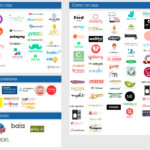Foodtech: robots, meal delivery services and healthy food
Technological transformation is changing the rules of the game in many industries. The world of food – and new consumption habits – have not escaped the innovation of the startups: intelligent kitchens, robot chefs, home deliveries in tupperware, food orders with no minimum amount, artificial intelligence to calculate calories... it´s time for foodtech.

“It´s a sector that’s experiencing rapid growth and whose real potential has hardly been displayed, in spite of the consolidation of some companies.” That´s how the foodtech sector is described by some big names in the industry, such as Darío Méndez (El Tenedor), Jesus Rebollo (Just-Eat), Luis Soto-Largo (Vitalista) and Alberto Benbunan (DelSúper).
It´s estimated that this year, the foodtech sector will reach $6 billion worldwide, according to Open Future. The technology and innovation applied to the food sector bring with them an endless array of possibilities. For example, knowing what we are eating will no longer be a mystery. In recent years, Google has created an app, Im2Calories, which uses artificial intelligence to calculate the number of calories a dish contains, just by photographing it. Another company, Tellspec, puts big data to work for safety, by designing pocket devices that can detect pesticides or metals in food.
The number of innovations is endless. Nanotechnology promises to create intelligent foods that will supply information in real time about the journey of a product from the time it is harvested until it appears on the table. Virtual assistants will propose menus according to tastes or allergies. Tech restaurants will offer gastronomical experiences via virtual reality, along with menus that have been personalized in accordance with a person's DNA, all of it with a meal prepared by robot chefs.
Moley Robotics was the first to create a robot kitchen in which the credit for the dishes goes to a robot. That´s what Mark Oleynik, CEO of Moley, told the Spanish newspaper El País. “What up until now we knew as a kitchen robot, was no more than a device that could crush, slice, beat and fry foods. Moley has come up with something completely different, which amounts to a kitchen with everything that's needed, that deploys two robot arms to do all the work... and to clean up afterwards. Thanks to Moley, anyone can have access to dishes prepared by the world´s best chefs.”
The use of robots is not limited to within four walls. According to Techcrunch, the delivery robots of Yelp24 and the startup Marble have been on the streets of San Francisco since the month of April, delivering orders. It´s as simple as having the users introduce a password ,that they have received from the app, onto the robot´s screen, allowing it to open the compartment that holds the food.
But robots are not the only new delivery boys. Home food delivery drones are a reality for a few people, a feat that the Domino´s Pizza chain introduced by surprise at the end of 2016 in New Zealand and which was repeated last March in Germany and the Low Countries.
Foodtech, Spanish style
Although home deliveries by robot have hardly begun in Spain, the foodtech ecosystem has become one of the sectors with the greatest growth in the startup world in recent years. According to El Referente, the digital newspaper specializing in news related to entrepreneurs, startups and innovation, Madrid is the city that contributes the largest number of startups to the ecosystem, approximately 50%. However, the companies based in Barcelona are the ones that receive the most investment. Specifically, more than 15 million euros, compared to six million euros in the Spanish capital.

List of companies in the foodtech sector in Spain in 2017 - Prepared by the author
Among these are: Cheerfy, a customer recognition and management tool that enables businesses to know more about users; Pulsayvoy, a wireless push-button switch that is ideal for communication between customers and workers of hotels and restaurants; SocialFood, a social network based on the collaborative economy that turns lunchtime into an opportunity to meet new people; Comprea, an online supermarket that offers brand-name products at specific supermarkets; Wetaca, a service that sends “tuppers” with dishes for an entire week, prepaerd by chefs ; or the app Diet Creator, which offers nutritional information and made-to-order diet menus.
The kings of home delivery
Deliberry, Dietox, Takeachef, DelSuper, ApetEat… there are many companies in the “eat at home” sector. Keeping in mind their number, it´s not surprising that the online home food delivery companies have achieved a market penetration of 30% in 2016, which the consulting firm McKinsey estimates will reach 58% by 2020.
Just Eat, Deliveroo, Glovo and UberEATS are the four biggest players in the delivery market, with Just Eat heading the list. Following its acquisition of La Nevera Roja in 2016, this platform has reached a market share of nearly 70%, according to data from the National Markets and Competition Commission. Among its biggest competitors are Deliveroo and Glovo (which delivers orders of all kinds, not just food) and UberEATS, linked to the private transportation startup, and is the latest to arrive on Spanish territory.
At the end of January, Madrid joined the 70 cities in the world where UberEATS offers its services. Nearly 30,000 people have downloaded the app and more than 400 restaurants use it. The absence of a minimum amount for orders is what differentiates this platform from the rest, explains Manel Pujol, general manager of UberEATS in Spain, in an interview with the El Mundo newspaper.
The law of the call
In home delivery, the situation is balanced between customers who place their orders by phone and those who use an app or a computer. However, the same is not true for making reservations to eat outside the home. According to the FoodISDIgital report, which analyzes users’ behavior when making restaurant reservations, 70% of these continue to be made by telephone and only 30%, online.
Apart from the delivery services of Just Eat or UberEATS, and the food prepared by some companies such as Foodinthebox or Wetaca, everything related to healthy food is a booming business. “In recent years, Asian food, principally Japanese, and so-called ‘healthy food’ has come into vogue and is also among the most demanded by users,” Marcos Alves, founder of El Tenedor, told Vanity Fair magazine.
Everything related to healthy food is a booming business"
100%-vegetarian Calabizo brand pumpkin sausages, Wellthy drinks with natural ingredients or Smileat baby food, with 100% ecological ingredients, are just some examples of the healthy food companies that have found their place in the Spanish foodtech universe.